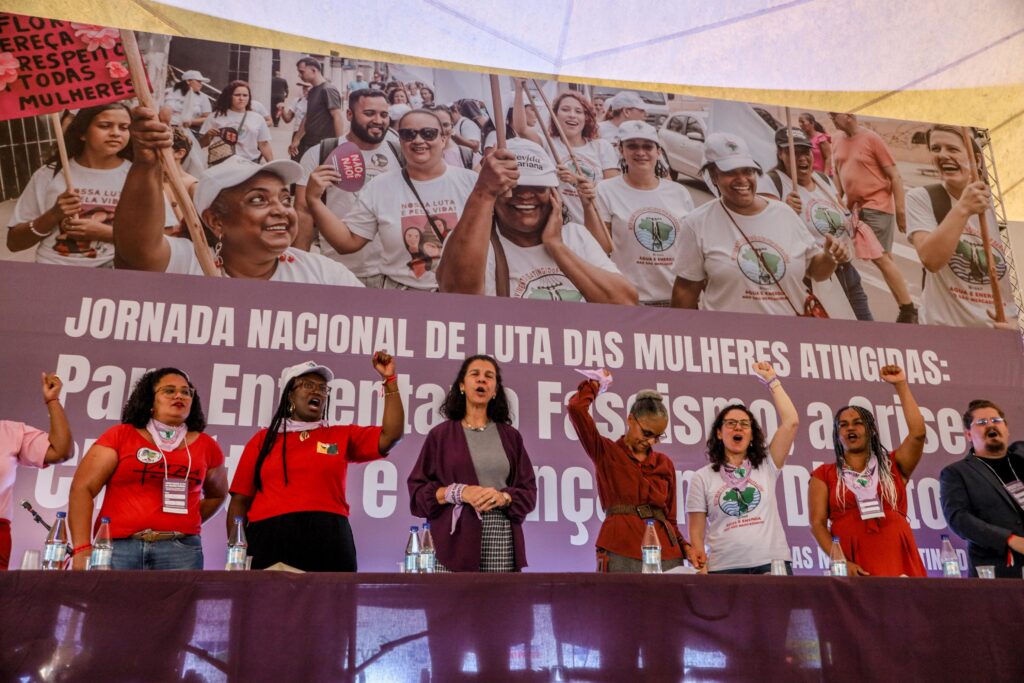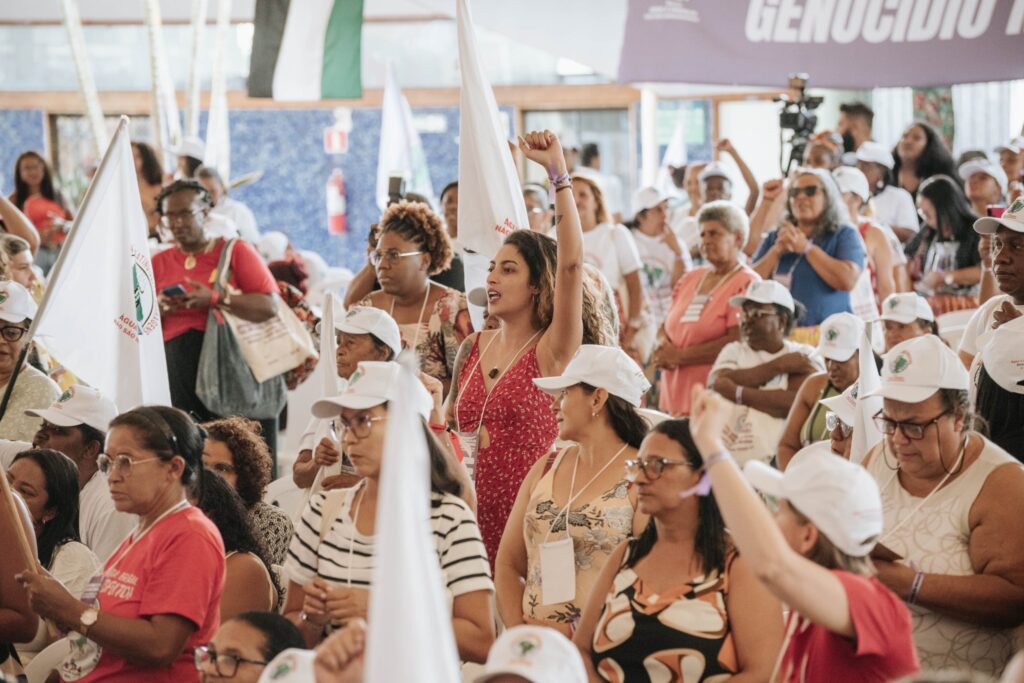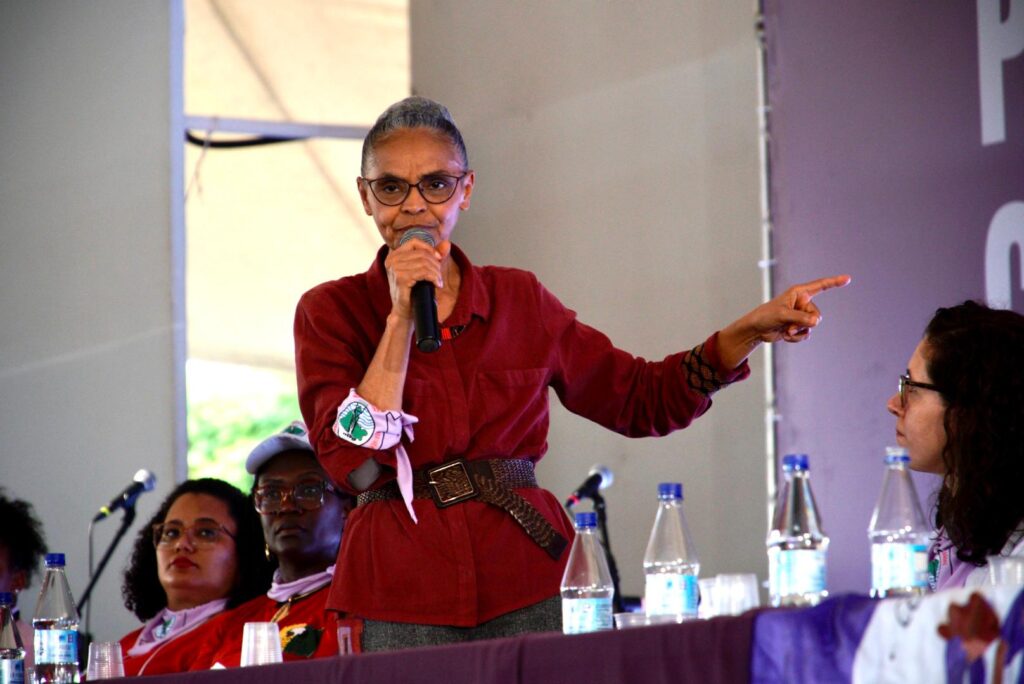Minister Marina Silva participates in the opening of MAB Women’s Struggles Journey, in Brasília
Marina says that women united are essential in the fight against the dismantling of environmental licensing, which directly impacts those affected
Published 03/06/2025 - Updated 04/07/2025

The Women’s Struggles Journey of the Movement of People Affected by Dams (MAB) began in Brasília, Federal District, Brazil, in an emotional event featuring the participation of Brazil’s Minister of Environment and Climate Change, Marina Silva, who was acclaimed by nearly one thousand women from 20 Brazilian states.
The opening ceremony was attended by several authorities and leaders, reinforcing the plural and representative nature of the event. Among those present were Professor José Sobreiro Filho (Nino), Congresswoman Erika Kokay (PT), the Episcopal Advisor for Transformative Social Action of the CNBB, Alessandra Miranda de Souza, the representative of the National Coordination for the Articulation of Black Rural Quilombola Communities (CONAQ), Xifreze Santos, the Dean of Extension at UnB, Professor Janaína Soares de Oliveira, and the National Coordinator of Via Campesina Brazil, Selma Dealdina Mbaye.
At the opening act, the Affected Women expressed solidarity with the Minister, following the episode of violence that she faced in the last week at the Federal Senate, when she was defending protection of the Amazon region. “Marina Silva represent us and symbolizes the confrontation against fascism, sexism and misogyny in our country”, said Liciane Andrioli, member of the MAB’s coordination.
Implementation of the Rights to Reparation
The mobilization continues until June 5th, World Environment Day, with a central demand for effective regulation that ensures the right to life, security and reparation to the affected population. One of the most urgent topics is the National Policy of Populations Affected by Dams (PNAB, in Portuguese). Despite it being approved and signed in 2023, the PNAB still needs resources and enforcement policies to become reality.
The Journey’s participants came to Brazil’s Federal Capital also to march and express their rejection to the dismantling of environmental legislation and to any kind of injustice and gender violence that affected them. Alexania Rossato, of the MAB’s Coordination, emphasized that women are those who feel more intensely the impact of large enterprises on their territories, be it in the Amazon, Minas Gerais, or another region.
“We’re affected by dams, the crimes that occurred in the city of Mariana (Minas Gerais), in the state of Maranhão, and the dam ruptures that devastate countless family lives and the environment. We’re also affected by the events of the climate crisis that afflict us from the South to the North of this country. Moreover, we’re women who fight”, reinforced Alexania.
Women’s protagonism in fighting against fascism

Marina Silva, in her statement, urged the women to keep fighting and occupying places of authority. She stressed the relevance of environmental licensing (under threat in the Federal Congress) to mitigate the enterprise’s impacts that affect the population’s lives, especially of those affected by dams. “Here, we have people who are victims from these enterprises that, they say, could self-regulate. We, more than anyone else, know that when the license is not applicable according to the law, the harm to the environmental and to the communities’ lives are immeasurable and, many times, irreversible”.
The Minister has alerted that “cases such as Mariana (2015) and Brumadinho (2019), besides the constant impacts of climate change, serve as tragic examples that occur when the correct care with the environment is neglected”.

She explained that, if Bill 2159/2021, in progress at the Chamber of Deputies, is approved, the water and soil contamination caused by dam ruptures, which destroy the lives of whole communities, would be considered indirect damage. It could facilitate the liberation of medium-sized enterprises with large potential for devastation.
AAt the end, Marina Silva reaffirmed the commitment of the Ministry of the Environment to dialogue with the legislators, seeking to conscientize them about the effects of this and other bills concerning the Affected. “Civil society and the social movements must demand time for a profound debate, that permits knowledge of these proposals and their consequences”.
Despite the challenges to be faced, she said that the message to the Affected Women in Brazil is of courage: “The courageous women we see in many movements, like the MAB, are in the frontline to fight for their territories, their communities to protect life, food and energy safety. I hope this resistance, that today is an act of permanence and of choice of where we wish to be, and not where others wish we were, transforms into a new way of life”.
Journey Schedule: Speakers, Fair and meetings with Government Authorities

The first day of the MAB’s Women’s Struggle Journey was highlighted by a diversified and engaging agenda. In the arc of activities, the opening of the Cultural Fair of the MAB’s Women, a vibrant space for selling artisanal products from communities and an important meeting with other authorities of Lula’s Government took place. There was also an act against the genocide in Palestine and political formational spaces, with debates about crucial themes for women, like the consequences of energy models, the climate crisis, patriarchy, and gender violence.


